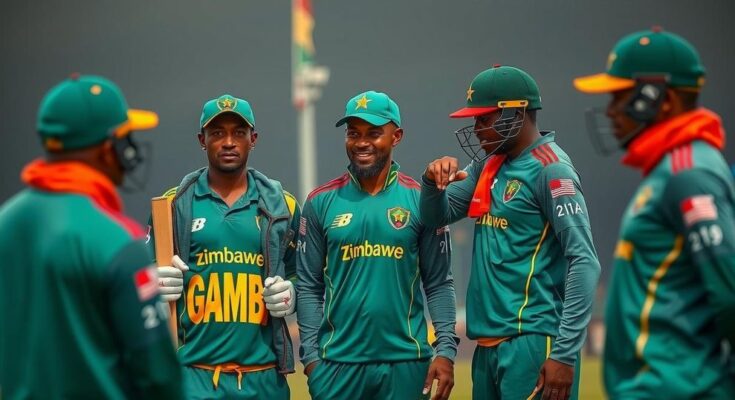Zimbabwe is competing against Gambia and Seychelles in the qualification process for the 2026 T20 World Cup due to having missed direct qualification spots previously. The ICC has structured the tournament to include 20 teams, with 12 automatic qualifiers and 8 determined through sub-regional qualifiers. Injuries and other national performances have further complicated Zimbabwe’s standings, as they look to secure their place by advancing through the qualifiers in Kenya.
Zimbabwe, recognized as an International Cricket Council (ICC) Full Member, is competing against Gambia, ranked 95th, and Seychelles, ranked 91st, in the qualification process for the 2026 T20 World Cup. This situation arises due to the distribution of automatic qualifications for the tournament, where only twelve teams had guaranteed entries while the remaining eight spots necessitate further qualifications through sub-regional qualifiers that culminate in regional finals. The 2026 T20 World Cup will see participation from 20 teams overall. The two host nations, India and Sri Lanka, automatically secured their spots, along with eight teams that advanced through the Super Eight of the previous 2024 T20 World Cup. The qualified participating countries include renowned cricketing nations like India, Australia, England, West Indies, Afghanistan, South Africa, Bangladesh, and the United States. Pakistan, New Zealand, and Ireland have also made it through based on their rankings. Unfortunately, Zimbabwe’s path to qualification was adversely affected by the ascendance of the United States in the cricketing realm, as their impressive performance during the last World Cup—highlighted by a notable victory over Pakistan—secured them a direct entry into the tournament. Consequently, Zimbabwe missed the opportunity to gain automatic qualification and must now pursue qualification through the Sub-Regional Africa Qualifier B, held in Kenya. In the qualifiers, Zimbabwe has been grouped with Kenya (ranked 33rd), Mozambique (ranked 64th), Rwanda (ranked 63rd), and the aforementioned teams of Gambia and Seychelles. Engaging in this qualification process reiterates the challenges previously faced by Zimbabwean cricket and highlights their ongoing struggle to secure a position in global competitions. The upcoming matches against Gambia and Seychelles become paramount in realizing their aim to participate in the 2026 T20 World Cup alongside the best in cricket.
The 2026 T20 World Cup qualification presents a competitive landscape where multiple teams will vie for limited spots. Given the structured qualification process being employed by the ICC, it necessitates full engagement from teams such as Zimbabwe that have historically found themselves on the periphery of major tournaments. The competitive nature of current cricket and the ascent of other nations, such as the United States, create formidable barriers for teams attempting to secure their positions. Henceforth, the importance of sub-regional qualifiers and performances will be crucial for teams in similar positions to achieve desired outcomes.
In conclusion, Zimbabwe’s participation in the qualifiers against Gambia and Seychelles for the 2026 T20 World Cup exemplifies the evolving nature of international cricket qualification. The significant impacts of prior performances from other emerging cricketing nations, particularly the United States, have underscored Zimbabwe’s need to navigate a challenging qualification process. Successful engagement in the upcoming matches will be critical for Zimbabwe to regain its standing within the global cricketing arena.
Original Source: www.wisden.com




